10 Tips for Improving Vein Health
You probably don’t give much thought to your veins, at least not until you start having problems with them. Our veins carry oxygen-depleted blood back to the heart from all over our body, which makes them not only impressive but also incredibly important.
The most common conditions affecting veins are spider veins and varicose veins. Although many people find them merely cosmetically unsightly, they can also indicate a more serious condition or cause symptoms. Symptoms can include pain, a throbbing or burning sensation, restless legs, and leg fatigue.
Venous disease can range from mild to life-threatening, affecting the hollow tubes (veins) that carry blood around the body or the flaps inside of them (valves) that ensure blood flows in the right direction.
Symptoms of venous disease include:
- Leg/ankle swelling
- Itchy, painful legs
- Pain while walking that stops while at rest
- Varicose veins
- Brown-colored skin, particularly near the ankles
- Leg ulcers
There are a number of risk factors for venous disease: being older, being female, obesity, sitting or standing for long periods of time, pregnancy, a family history of vein conditions, and a personal history of deep vein thrombosis (DVT). Although you can’t always prevent venous conditions, you can take steps to improve your vein health and lower your risk.
- Quit smoking, or don’t start smoking.
Along with causing lung disease, heart disease, stroke and cancer (and increasing your risk for a host of other conditions), smoking also damages your circulatory system. This causes veins to harden and narrow, and blood to thicken.
- Get regular exercise.
Exercise helps keep your heart and circulation strong and healthy. Walking is a great choice. You can also try jogging, swimming, biking or any activity that involves moving your legs to enhance circulation.
- Move more during the day.
If you sit or stand for long periods of time, make sure you move often. Take breaks to walk around, exercise or stretch every 30 to 60 minutes to keep your blood circulating and prevent blood from pooling.
- Maintain a healthy weight.
Carrying extra weight puts more pressure on your veins. Losing even a little weight can help. For the best improvements, make reaching a healthy weight your goal.
- Stay hydrated.
Water helps to thin your blood, which makes it easier for your veins to circulate. It also makes blood clots less likely to form. Drink plenty of water throughout your day to ensure proper hydration.
- Eat a healthy diet.
Eating a diet rich in fruits and vegetables is great for your vein health, as well as your general health. Avoid consuming too much sodium, which can damage blood vessels and raise blood pressure.
- Elevate your legs.
Raising your legs regularly to the same level as your heart or higher will help improve blood flow and reduce swelling. It is a good practice even for people with healthy veins, but especially for those who spend prolonged periods sitting or standing and people experiencing vein problems. Aim to raise your legs for at least 10 to 15 minutes each day. You can lie on your back and put your feet up on a wall, or prop them up on some cushions on the couch while you relax.
- Choose clothing carefully.
Tight clothes and high heels can restrict blood flow, causing blood to pool in the leg veins. Try to wear comfortable, non-restrictive clothing. Opt for flat or low-heeled shoes as much as possible.
- Consider compression stockings.
This might seem counterintuitive after reading tip No. 8, but compression stockings are designed to increase blood flow by applying pressure to the muscles and tissues in the lower leg. Compression stockings or socks can be beneficial for people who are at risk for or have venous conditions. Speak with a healthcare professional before wearing compression garments to make sure they are right for you, how to wear them effectively and to ensure you are measured for the right fit.
- Seek prompt treatment for vein problems.
If you begin experiencing symptoms of venous disease or if you have spider or varicose veins, schedule a consultation with a vascular specialist for a thorough evaluation.
The Vein Center at Advanced Cardiovascular Specialists offers a full spectrum of diagnostic tests, and medical and cosmetic treatments for venous conditions. We focus on diagnosing potential underlying issues that might affect your cardiovascular system, and then provide appropriate treatment on a convenient outpatient basis.
The team at Advanced Cardiovascular Specialists consists of North Louisiana’s leading experts in cardiovascular care. For more information or to schedule an appointment, please call our office at (318) 798-9400.

